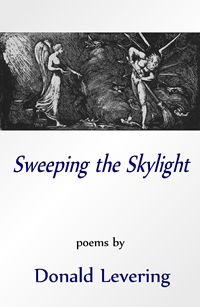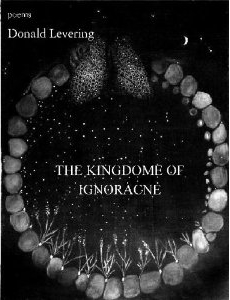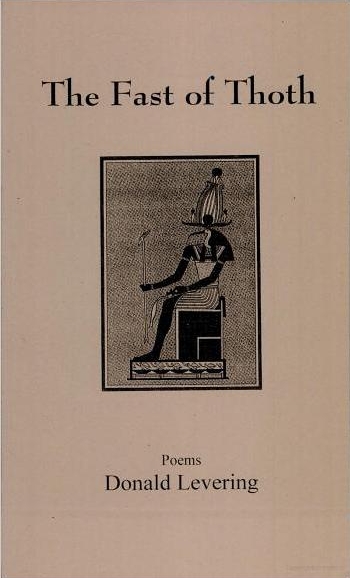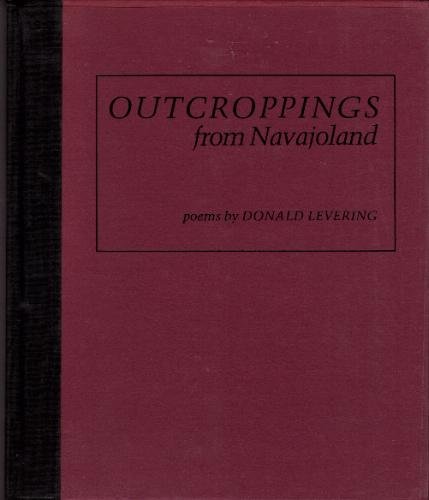You may order books directly from Donald at the address on the Contact Page or click on book title to order.
 Any Song Will Do, Red Mountain Press, 2019, $19.95 |
Donald Levering’s 15th book of poetry, Any Song Will Do, New and Selected Later Poems, picks up where his last book, Previous Lives, left off in its retrospective of over 40 years of poetry writing. Previously uncollected newer poems comprise over a third of the book; the rest are selected from four of his books published since 2012. The title is derived from a line in a poem that celebrates the readiness of the Irish to burst into song or story. Just so, this highly musical poet is ever-attuned to possible poem grist. Included are ruminations on origins, poems on nature’s grace and beauty, elegies, meditations on transience, praise for the odd and strange, and shamings of outrageous things. Levering’s mastery of varied poetical voices and rhetorical strategies is abundant here. The introduction explains the author’s views on the “four feet” of his poetic horse: metaphor, music, invention, and sympathy. |
 Previous Lives, Red Mountain Press, $19.95 |
Previous Lives: New and Selected Early Poems cherry-picks poems from this widely-published poet’s 40 year career. Arranged to flow thematically rather than chronologically, selections from his first 8 books are interspersed with previously uncollected poems in 97 pages. The book showcases Levering’s broad stylistic range. Free-verse partners with pantoum, ghazal, and blank verse. Tight, imagist gems nest beside Whitmanesque declamatory odes. The title is at play where the speaker portrays various lives: a snow-plow driver, a highway surveyor, a man who steals subway trains, a prisoner in a Borges story, a stroke-afflicted astrologer, a Navajo healer, a kachina doll salesman. Humorous paeans to Roethke, Bly, and Freud lend levity to a text that witnesses estrangement and war. Ravens, plants, and fungi are also featured in this former groundskeeper’s retrospective. |
 Coltrane’s God, Red Mountain Press, 2015, ($18.95) |
Coltrane’s God, Levering’s 7th full-length collection of poems, is a departure from his recent books, which have focused on environmental and human rights issues. Instead, love of music and honor for musicians are the heart of Coltrane’s God. Among the players in his joyful tribute to the “language of emotion,” are a street busker wailing laments in the rain, a choir boy with changing voice, an itinerant fiddler, romping barrelhouse piano players, and a woman singing scat in a tram tunnel. The book is garnering praise from other writers. Dorset-prize winner Lauren Camp says that “In Coltrane’s God, the landscape of life opens though music. Even the sad is insulated with sound. These poems are intoxicated with chords and changes.” The musician-poet Kevin Rabas, author of Bird’s Horn, writes, “Levering’s Coltrane’s God is a hip, historical collection of “flatted thirds and sevenths,” full of those characteristic, jazzy blue notes, poems sung as if through saxophone and smoke. Levering has an ear and eye for jazz, and what he writes here is part history, part song, following a lineage of jazz poets, including Hughes, Kerouac, Baraka, Carruth, Harper, and Mackey.” |
 The Water Leveling With Us, Red Mountain Press, 2014, ($17.95) |
The Water Leveling With Us – Donald Levering’s 12th poetry book, The Water Leveling With Us, witnesses critical dramas of our era. The impacts of climate change, militarization, and consumerism are viewed through individual experience. The poems spotlight moral dilemmas, such as the woman haunted by the foxes she raises for fur. Moments of redemption through nature offer relief; there is the prison camp escapee who gains solace among frog song, or the man who flies an ultralight to teach orphaned whooping cranes “what they didn’t know they knew.” As always, Levering’s language is rich with rhythm and assonance. Several of the poems have been published in journals such as The Alembic, The Drunken Boat, Hunger Mountain, Iron Horse, Poets For Living Waters, and Stirring.Donald Levering takes us from ocean bottom to outer space, and from the jungles of Costa Rica to Arctic regions to the Andean heights of Chile, observing all the while the ways in which the earth’s surface and its creatures labor to survive. These poems are never didactic; rather, they are restrained and beautifully rendered. They evoke over and above the vulnerability man has imposed on nature, the vulnerability of man himself as he shares with them the shadow of extinction. Elegiac and observant, these poems illuminate the connections that inform our lives. —Leslie Ullman, winner of the Yale Series of Younger Poets Award and the Iowa Poetry Prize. |
 Algonquins Planted Salmon Red Mountain Press, 2012, ($16.95) Algonquins Planted Salmon Red Mountain Press, 2012, ($16.95) |
Algonquins Planted Salmon – Donald Levering’s 11th poetry book, Algonquins Planted Salmon, makes myths into poems of wonder and warning. It celebrates dancing cranes, flitting moths, and falling stars. It likewise decries river damming, coal mining, and monstrous poisonings, such as at Fukushima and the sonic onslaught on dolphins. It is a book in which, “Nature is making her last stand,” being paved over “to make way/for the passing of humans.” It closes with elemental odes offering succor: a night train from the ice ages, juncos whose feet “tap out the secret of flight,” gravity as circus master, an apostrophe to the wind. The majority of the 41 poems have been published in journals, such as Hiram Poetry Review, Oyez Review, Quiddity, and Water-Stone. While the free-verse voices and styles of the poem vary, there is a unified sensibility and focus on the place of humans within an evolving creation.Levering is original. He interprets ordinary situations with unexpected twists. Each poem is a mystery with clues and a final revelation.—Kansas City StarWhen I read his poems it’s as if I’m in a world outside of time, looking at daily life from a new perspective in which everything becomes symbolic.—Victor Contoski, author of Astronomers, Madonnas, and Prophecies; Homecoming; and Broken Treaties.The metamorphic poems in Donald Levering’s new book take us on a remarkable set of adventures.—Charles Goodrich, featured poet on Garrison Keillor’s A Writer’s Almanac, author of Going to Seed, and Spring Creek Project Director. In this collection about us and the whole, Levering makes possible a perception of human days on Earth not separated from creation itself.—Susan Clare, Director and Editor of Together Yes. |

The Number of Names Sunstone Press, 2012, ($16.95)
|
The Number of Names – “The voice of these poems is discriminating and sympathetic, the act of naming carefully and lovingly articulated; they include our motives toward beauty and evil…In our age of diminishments, The Number of Names undertakes the difficult task of celebrating, without gratuitousness, an abiding variety and abundance.” —William Wenthe, Pushcart Prize winner and author of Not Till We Are Lost, nominee for the Pulitzer Prize in Poetry and The National Book Award“The poems in The Number of Names are among Donald Levering’s most compelling and philosophic work. It is as if the poet had paused in the midst of life to contemplate death, change, and inheritance−not as separate things but as part of an ongoing poetic present. A sense of another world‒dream, myth‒permeates this book and enriches us as readers.” —Miriam Sagan, Lannan Foundation Marfa Resident and Director of the Santa Fe Community College Creative Writing Program; author of over 20 books, including Map of the Lost |

Sweeping the Skylight Finishing Line Press, 2012 ($12.00)
|
Sweeping the Skylight – In Sweeping the Skylight, the brilliant poems of Donald Levering capture and release the fermentation of time, and the light from below.” —Richard Louv, author of The Nature Principle and Last Child in the Woods, and recipient of the Audubon Medal.“Sweeping the Skylight elevates the inner workings of the domestic‒clothesline, cellar, microwave‒to their near-mythic roots: fire-smudged caves, calls of hump-backed whales, cathedral chants. And when the house falters as a marriage dissolves, Levering’s poems evoke a loss of relative magnitude. This collection is necessary and urgent, like “a ventilator/like a prayer.” —Valerie Martínez, Levis Poetry Prize Winner, author of Each and Her, And They Called It Horizon, and Santa Fe Poet Laureate.These poems are not like the brain-stem fantasies (video games, graphic novels, etc.) magic-lanterned on LCD screens that transfix the great unwashed: they are the real thing. Donald Levering’s Sweeping the Skylight, as that apt title suggests, brings a fuller light onto the ordinary world, defamiliarizes it, freshens the reader’s sense of it‒deals revealingly, as the epigraph from Richard Wilbur for the poem “Insulation” capsules the topic, with “the buried strangeness / Which nourishes the known.” Here a confident, mature poetic voice shares the unexpected and memorable significances that can be discovered in daily‒even domestic‒life.” —Michael L. Johnson, author of Sky Land: A Southwestern Cycle. |

Whose Body Sunstone Press, 2007, ($16.95)
|
Whose Body – Levering reaches beyond the realm of the self to offer us a panoramic view of what it means to live fully in the body, with its failings and longings and ecstasies. These poems are brave and visceral as they bear witness and surprise the reader with surreal turns, fresh connections, and lovely observations. Best of all they refuse to let the body have the last word even as the body is the vehicle through which the spirit must necessarily find expression.” —Leslie Ullman, Professor Emerita, the University of Texas-El Paso |

The Kingdom of Ignorance Finishing Line Press, 2006, ($12.00)
|
The Kingdom of Ignorance – Donald Levering spans life from schooldays to a timely look at the ocean depths, always writing with an appealing lyrical style. He is a disciplined poet, changing the shape of his layouts to match the tension and tone of each one. He looks with empathy at an autistic student, and imaginatively at the city of Orvieto as he negotiates his chosen kingdom. This little book is as intelligent as it is observant. A proven writer who has long published in admirable magazines, he is well worth reading and this is an excellent collection to introduce him.” —David Chorlton” Levering … adds to the storehouse of printed magical wisdom. Levering shows a child’s awe about nature’s mysteries—nesting sea turtles, idiot savants, and the sea-and-lightning-charged soup of primordial life. Also, he sounds the depths of imagined realities—alchemy, wood fairies, video-game jaguars, and human love. This is an essential, inspiring missal from a master poet. Don’t miss it!” —Denise Low |

The Fast of Thoth Pudding House Press, 2002
|
The Fast of Thoth – Thoth was the god of scribes and writing and invented the Egyptian calendar. In this unique chapbook, each poem takes its cue from a calendar image for that month. “November” is based on a Famous Shipwrecks calendar for that month in 1975, when an overloaded Edmund Fitzgerald sank in a storm. “August” conjures the illusions created by a calendar of stereograms. “April” is based on a calendar of quilts. February is a Valentine poem using a National Geographic calendar photo by David Doubilet of a heart-shaped gyre of barracuda. March’s “Weird Weather” chronicles record-breaking tornadoes, avalanches, hailstorms, lightning strikes, snowfalls. “October” is from the Poets’ Year, which includes Keats’ Hallowe’en nativity, Poe’s croaking raven, Denise Levertov’s paeans to peace, Rimbaud’s smuggling of guns, Dylan Thomas preaching poetry’s “holy tongue,” e. e. cummings’ “non lectures,” Edna St. Vincent Millay’s prodigy, and Walt Whitman’s death masque. Truly a one-of-a kind book. |

Horsetail Woodley Press, 2000
|
|

Outcroppings from Navajoland Navajo Community College Press, 1985
|
|

The Jack of Spring Swamp Press, 1980
|